Last updated: 15 July 2023
Recently I’ve stepped back from theatre events, mainly because of the time. Time to attend, scan the programme and compile my thoughts into a review that’s both informative, opinionated and fair. So when an invite to Voices from Chernobyl arrived in my inbox I knew I wasn’t going to say no. After all, we spent two days exploring what lay within the Chernobyl exclusion zone and an entire day in the remnants of the city of Pripyat. I knew this play would hit a nerve, I just wasn’t sure how much.
The play is adapted from the book by the same name. The Belarusian author, Svetlana Alexievich who won a Nobel Prize in 2015 for her “polyphonic writings”, drawing on interviews and testimonies from survivors of the world’s worst nuclear disaster.
Alexievich’s writing recites hundreds of stories of Pripyat’s former residents. After an explosion in the number four reactor at the Chernobyl Nuclear Power Plant on 26 April 1986, these Chernobyl survivors were lured into the streets by the euphoric crimson glow emitting from the Plant. All the while they were completely oblivious to the deadly radiation that was airborne and seeping into their bodies, crops, animals and homes.
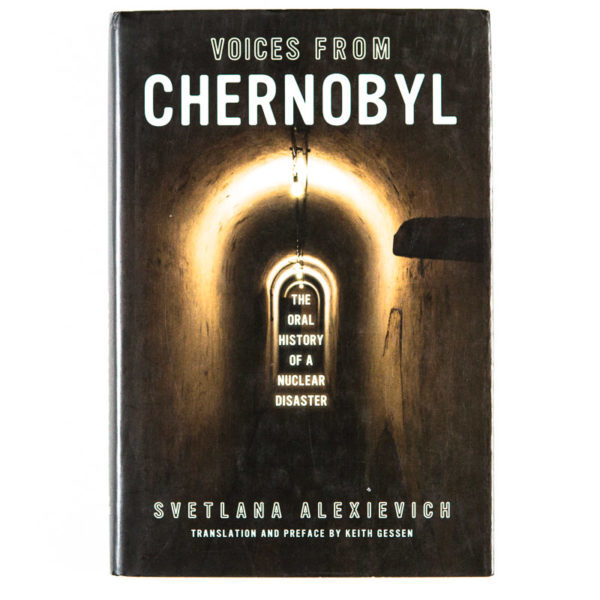
Performed at the Cockpit in North London, the stage is bare. A slab of concrete, a black backdrop and very few props for which the cast of six actors to use to tell their stories in a mix of Russian and English.
Director German D’Jesus had a challenging task of taking a monumental disaster and making a one hour production with the right amount of authenticity and humility. Voices from Chernobyl hits the mark.
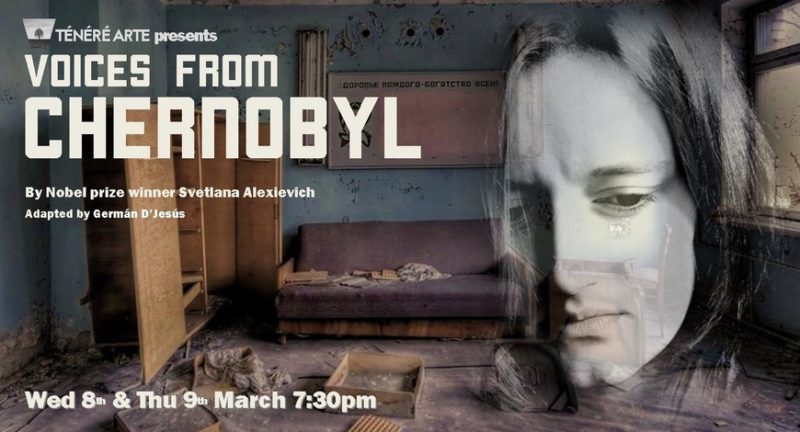
Actors take to the stage and take on roles of those involved and tell stories of ‘that’ night. Wives of firefighters remember their husbands racing off into the night to fight a fire, ‘a minor incident’ as described by the authorities.
Others remember the robots they had on hand in case of an accident, which malfunctioned within minutes because of the colossal levels of radiation. Like a badge of honour, they remember how the best robots to shovel graphite and move radioactive materials were men, their men. They were known as “green robots”, working in two-minute shifts, sprinting across the roof of the reactor without protective suits, where they were exposed to the radiation spewing into the atmosphere.
“People fear their superiors more than the atom.”
For Pripyat residents, if you couldn’t see radiation was it even real? They assumed by closing the doors and windows of their homes that they were suitably safe. That was based on the information they’d been told and surely the Soviet Union would take care of them.
“Any unofficial information is considered foreign ideology.”
The stories and memoirs continue, remembering the days after the explosion, and how life in the city remained normal. Children played in the street, they dug up potatoes in the ground for food, drank milk from cows and mothers breastfed their babies.
“They closed the wells, covered them with cellophane. They said they were dirty, but how can that be? It looked so clean.”
In the days following the event and as the radioactive cloud moved its way across the European continent, Soviet authorities denied any incident to the world. The Soviet Union was determined to contain the incident that was already impacting on neighbouring countries; Belarus taking the brunt of it.
At 2pm on 27 April, 36 hours after the explosion, authorities arrived and evacuated the city of Pripyat. 43,000 residents were loaded onto 1,200 buses with the promise of returning ‘in a few days’. They packed just enough to get them by for two or three days; some food, underwear, and their identity papers. Their Dosimeters, that measured the amount of radiation to which you were exposed, were confiscated. That day, as they left everything behind, they also lost everything, they were never to return to Pripyat.
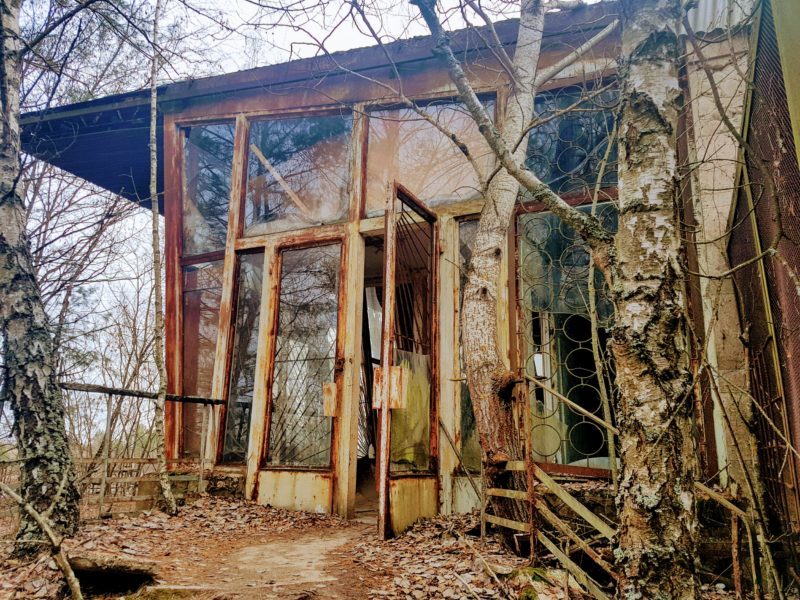
The final scene is a monologue. The same monologue that opens the book. A moving story of a 23 year old woman, secretly pregnant. Her husband, a first responder, a liquidator as they were known. She visits him in the hospital. She is not allowed to touch him, she shouldn’t even be near him as he exudes unknown quantities of radiation from his body like a supernova. Her unborn child absorbs the radiation like a sponge, a nuclear sponge. Four months later the woman tells how she gave birth to a daughter. Born with cirrhosis of the liver and a myriad of other complicated health issues as a result of acute radiation. The child died four hours after birth however by absorbing the radiation, the child saved the mother’s life.
Throughout the performance one message continues to resonate. The authorities and careless policymakers never informed the workers or the local residents about the dangers of radiation. The Soviet Union sent thousands of people to Chernobyl to clean up the disaster. The naivety of locals, their reckless heroism and blind patriotism for their motherland ultimately killed them or ruined their lives for generations to come.
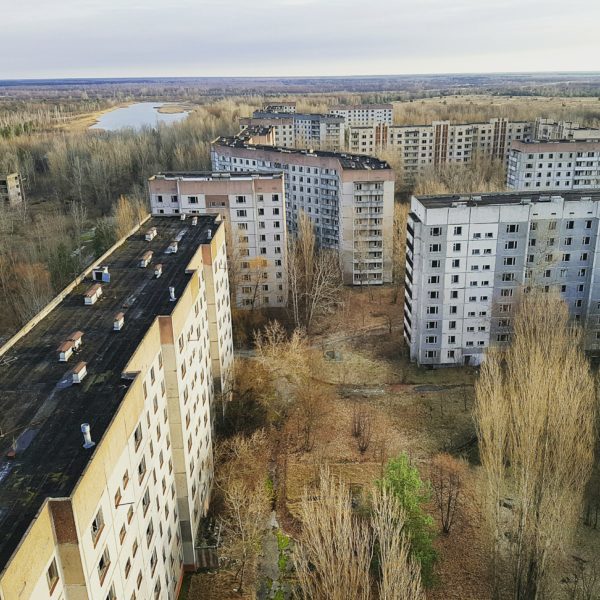
The Q&A
In a Q&A after the performance, the Director German D’Jesus and Producer, Liza Ermolenko opened a discussion to the audience about their own personal experiences.
A Ukrainian woman aged three when the event occurred. Her family had Geiger counters and would take them to the market when buying produce. “We’d test apples” she said, “you couldn’t trust the stall owner, they might be Chernobyl apples”.
Another remembers the couch they had in their home. They kept it, despite it being exposed to radiation, “you just weren’t allowed to sit on it”, she said.
A more recent sufferer, a woman tells the audience about her cousin. She was born with many health issues as a result of radiation caused by Chernobyl. She’s a woman now, and found love and happiness in life. Her relative is pleased for her, saying she will never have a ‘normal’ life, but at least she’s happy.
Lastly a mature woman from Galloway remembers it clearly. Describing the anxiety they felt as the radiation cloud moved across Europe, making its way to Great Britain; “that killed their sheep for a decade”, she said.

Final Thoughts
Reflections, as I looked around in the crowd I noticed many audience members nodding along or laughing instantly to the Russian jokes. They were young, Russian speakers, mostly barely old enough to have lived through Chernobyl, but certainly knew about it.
It touched me how the play gave the people a voice and a face. It was all the more touching after visiting Pripyat. Seeing their homes, their school, the hospital that treated the liquidators. It wasn’t just an incident, or an event. They are people.
Voices from Chernobyl
When: 2 May – 13 May 2017
Where: The Brockley Jack Studio Theatre, SE4 2DH
Cost: Tickets from £12

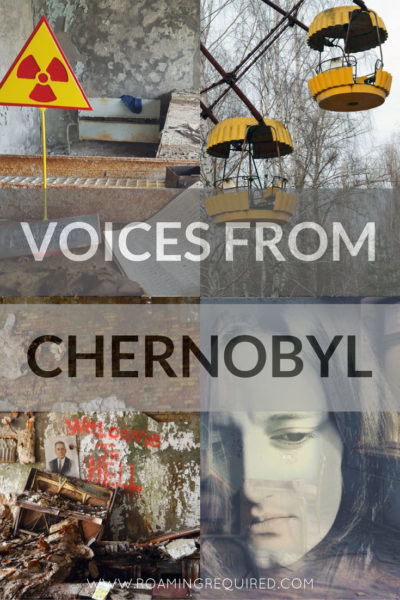
[…] Voices from Chernobyl – Review – Roaming Required […]